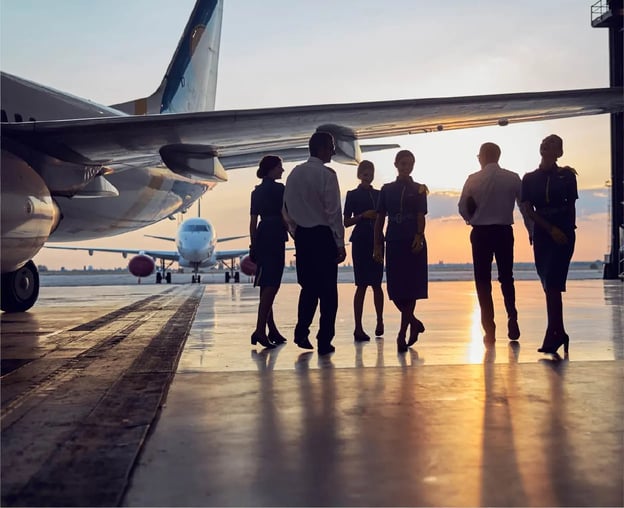The quest for knowledge can take us to unexpected places. When we seek hospitality inspiration, the first place we look is around us. We look to neighboring hotels, to award-winning technology, to industry leaders.
There’s nothing wrong with this. They are and always will be important sources. However, it also pays to peer over the walls of our own industry and search further afield for ways to better our operations, boost revenue and serve customers.
That’s a pretty broad canvas. So where to begin? We must look to other industries where guest experience is central to their purpose.
The obvious place to start is airlines. It’s an industry that dovetails neatly with our own, transporting passengers on their journey to become guests. And although air travel has only been around for a fraction of the time of hotels, they’re already far ahead in certain areas. Here’s what we can learn.
Table of contents
The utilization mindset
Running a profitable airline is hard. In 2023, the industry’s net profit margin was less than three percent. This requires an ambitious approach to utilization, and it’s definitely something hospitality can learn from.
Utilization isn’t just cramming as many seats onto a plane as possible. It’s also about managing staff and aircraft turnover. Because when a plane isn’t in use, it’s not making money – and exactly the same is true for your hotel rooms.
It’s true that budget airlines in particular can push the limit. In the quest for 100% utilization, there’s little wiggle room for delays, and passengers are made to wait as staff frantically prepare the plane for its next flight.
Your rooms are a lot easier to control. A modern hospitality cloud should be able to manage your room inventory in a smart, dynamic way. If a guest checks out at 10 a.m. and the next guest arrives at 6 p.m., that’s a full day of underutilization. Why not make the room bookable for day use? Or at the very least, monetize early check-ins.
For instance, if a guest tries to check in early using the new Mews Kiosk, it automatically searches to see if there’s an appropriate available room. If there is, they can pay a little extra and check in right away.
In other words, you’ll never be in a situation where new arrivals are waiting for their room to be ready. Hotels 1, airlines 0.
Mastering the upsell
High-performing airlines know how to upsell and cross-sell. Carriers whose passengers spend $20 or more on ancillaries generate an average of 8.2% return on invested capital. That’s more than five percentage points higher than for airlines whose passengers spend less than $5 on extras.
You know exactly what booking a flight is like. You’re not just reserving a seat: you can buy additional legroom, priority booking, extra baggage, food and drink, transfers...
How many upsells do you offer to guests? And, crucially, how easy is it for guests to purchase them? Booking isn’t the only point to capture these crucial ancillaries – online check-in is an effective method, as are onsite self-serve kiosks. Don’t forget in-stay communications either.
If you want more in-depth advice about your guest messaging, download our guide on Perfecting Guest Communication.
Lean into loyalty
Airlines know the value of loyalty. And make no mistake, loyalty can be very valuable. Air miles (or frequent flyer miles) are one of many common loyalty options that span memberships, tiers, partnerships and more.
Just as airlines don’t have monopolies over specific routes, most properties don’t have a monopoly on their location. Membership is an increasingly popular way for hoteliers to stand out from the competition, spurred on by changing travel habits and the digital nomad lifestyle.
The route you go down largely depends on your business and clientele. If you’re part of a hotel group, a tiered scheme that encourages travel to all your locations makes sense. If you run an independent, it could be a good idea to reach out to the local community and forge partnerships with special offers for more authentic stays.
You should also think about extending loyalty points beyond the reservation. If guests earn rewards for dining with you or using your spa facilities, you encourage them to spend more across your property. Diversified revenue makes for a stronger business.
Make sustainability meaningful
Almost every airline has jumped on the sustainability bandwagon (airwagon?) in recent years. When you book a flight, there’s usually an option to offset your carbon footprint by paying a little extra.
The problem is twofold. First, take-up is so small that it would hardly make a difference. A mere 1-3% of passengers typically choose this option. Second, these schemes are ineffective, non-transparent and abrogate responsibility. In other words: greenwashing.
The thing with greenwashing is that most people can smell it a mile off. If sustainability is a key part of your brand’s ethos (or if you want it to be), make sure your efforts are meaningful. Be clear about the positive environmental impact your policies make and it will also get guests more engaged.
For instance, if you introduce a hotel-wide recycling scheme, tell your guests exactly how they contributed. It’s as simple as a sign or a line in an email that says something like, ‘You helped us recycle 90 tons of waste last year – that’s enough to fill this hotel 20 times over.’ Active participation is the key to successful sustainability, and compared to airlines, hotels are in a much stronger position to encourage this.
Time to take flight
Ultimately, there are two key areas we can borrow from when it comes to airlines, and there is huge value in thinking deeply about both.
The first is the experience as a passenger. Next time you travel by air, pay extra attention to the customer journey, from booking through to landing. Where is the experience smoothest and where do you feel friction? How does this align to your own guest journey?
The second area is all about operational efficiency. Consider how they try to maximize revenue at every customer touchpoint and how they’re leveraging technology to automate and digitalize many of their tasks. What are the areas across your own property that could be better utilized? This could be physical spaces like repurposing and empty lobby, or through rethinking and blending staff roles.
The chances are your hotel could emulate the most successful parts of airline operations while also improving on elements that leave you frustrated. So go: book a trip and be inspired. It might help your hotel take flight.

2026 Hospitality Industry Outlook
Download now
Table of contents
Hospitality hot takes straight to your inbox



.webp)
